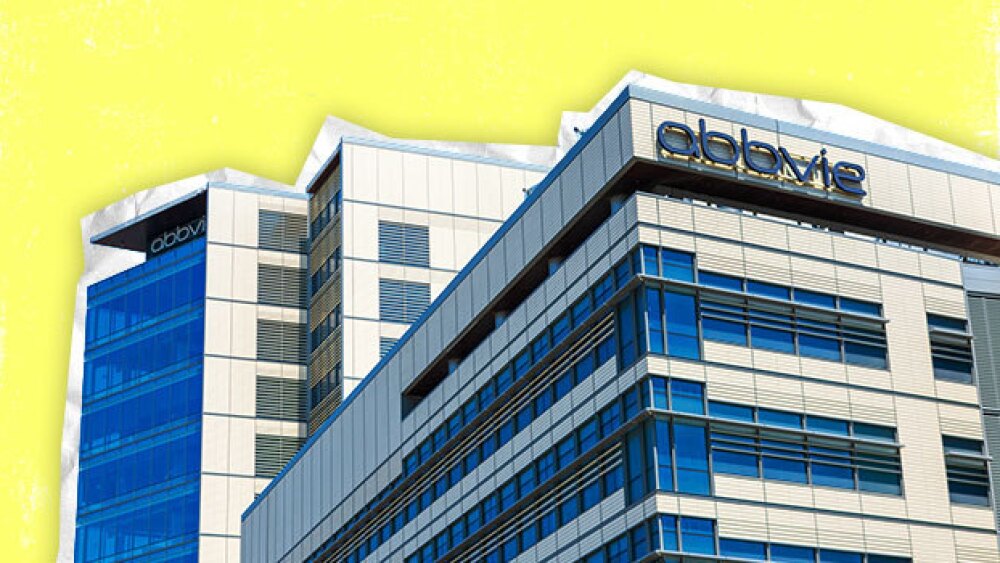Big Pharma’s appetite for safe and effective oral IBD drugs with novel mechanisms of action continues to grow, with my former company just the latest in a string of acquisitions in the space.
Pictured: False-colored image of AbbVie headquarters building/Taylor Tieden for BioSpace
On Monday, AbbVie agreed to acquire Landos Biopharma and its lead clinical candidate NX-13, a first in class once daily oral NLRX1 agonist, currently in Phase II clinical development for ulcerative colitis. I founded Landos in 2017 and it’s validating to see this tangible success of the assets my team and I invented, as well as the advanced computational platform I helped engineer. More broadly, this transaction is the latest to highlight Big Pharma’s growing interest in developing novel targets for inflammation and immunology (I&I) treatments, as well as the potential for cutting-edge computational drug development.
AbbVie, the maker of Humira, is among the world’s largest biopharmaceutical companies in part because of Humira’s commercial success, which underpins its multi-billion-dollar I&I portfolio. But its acquisition of NX-13 reflects an understanding that the market is ready for new options, particulary drugs that employ novel mechanisms of action (MoAs). Another example of a transaction involving a novel MoA in IBD is Roche’s $7.1 billion acquisition of Telavant Holdings, a vehicle in which Roivant and Pfizer have placed the rights to develop, manufacture and commercialize the experimental IBD drug known as RVT-3101 in the United States and Japan.
Meanwhile, Merck’s $10.8 billion acquisition of Prometheus last year encompassed not only a leading novel therapeutic clinical candidate (PRA-023/MK-7240) for ulcerative colitis (UC) and another type of IBD, Crohn’s disease (CD), but also the advanced computational engine that supported its development—clearly a driver of the premium price Merck paid for these assets.
Under the terms of this week’s agreement, AbbVie acquired some of Landos’ early-stage assets in addition to NX-13. But the pharma giant did not get the TITAN-X Drug Development Platform, the advanced computational system that first characterized and validated the therapeutic targets for NX-13 and omilancor. This proprietary computational engine for precision medicine is still owned and operated through NIMML Institute, a 501 (c)(3) nonprofit institute I founded to study the immune system. Because I, like the Big Pharma companies, recognize that drugs with novel MoA have the potential to become best-in-class or first-in-class therapeutics with enhanced market penetration and greater revenue generation in a multi-billion-dollar market.
The Original Landos Team and I Are Still At It
I left Landos in November of 2021 when its market capitalization was ~$600 million to start NImmune, a late-clinical-stage precision immunology biopharmaceutical company. My goal was to apply NIMML’s technology to create the next wave of biomarker-driven immunoregulatory therapeutics for precision medicine.
In 2023, NImmune re-acquired the late-stage clinical assets we created from the ground up at Landos such as omilancor, currently in Phase III clinical development for UC and Phase II trials for CD, and NIM-1324, Phase II–ready for lupus and rheumatoid arthritis. I and the original executive leading the Series A, B and IPO financings, along with the R&D teams that created the Landos therapeutic pipeline, continue to collaborate on the next wave of precision medicine drugs at NImmune, and there are several strong tailwinds at our backs. The space is exploding, and for good reason.
IBD afflicts more than 3 million people in the U.S. and 5 million people globally, with a prevalence increasing more than 5% per year. Existing treatments for IBD prove ineffective for the long-term management of the disease in most patients. There is an urgent unmet medical need for oral therapies that target new MoAs.
Increasingly, the discovery of new MoAs and the clinical drug development process are being optimized by A.I.-powered platforms with advanced computational modeling, data analytics and bioinformatics capabilities. In our case, the TITAN-X precision medicine platform characterizes novel therapeutic targets and identifies novel transcriptional signatures that accurately predict responses to treatment in UC and CD, inform patient selection, reduce development timelines, lower costs and improve probability of success in the clinic. In similar action to our TITAN-X precision medicine platform, the Prometheus360 platform was used to discover novel therapeutic candidates, inform patient selection and increase efficacy.
While many have described M&A as a stagnant market for biopharma, there are encouraging signs that this is no longer the case for I&I therapeutics—and novel immunoregulatory drug candidates are being advanced through the pipeline that could one day improve the lives of millions of patients living with inflammatory and autoimmune diseases. I believe AbbVie’s recent acquisition of my former company emphasizes the real potential (and value) of advanced computational drug development technology that enables innovative developers to rapidly and cost-effectively target and characterize new MoAs and create safer and more effective therapies.
I am quite proud of our team for the integral role we played in AbbVie’s acquisition of NX-13 and Landos’ other early-stage assets and look forward to continuing on the accelerated path to cures mission that we first set out upon in 2017. This transaction signals continued momentum for innovative drug developers, the potential of A.I.-powered advanced computational platforms like TITAN-X and hope for the broader I&I pipeline of next-generation precision medicines in inflammatory and autoimmune diseases.
Josep Bassaganya-Riera is the founder and former chairman, president and CEO of Landos Biopharma. He is the founder, executive chairman, president and CEO of NImmune Biopharma and president and CEO of the nonprofit NIMML Institute. Both organizations are devoted to the advancement of precision medicines for inflammatory and autoimmune diseases.





